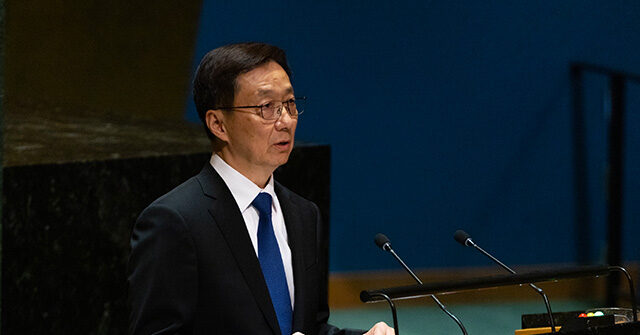Chinese Vice President Han Zheng promised the United Nations General Assembly during his address on Thursday afternoon that his Communist Party would never practice “hegemony and expansion” and promote dialogue and peace – before threatening the nation of Taiwan with the “firm resolve, strong will, and the power of the Chinese people.”
Han asserted that Taiwan, a sovereign country that has never been governed by a state based in Beijing, had been part of China since “ancient times,” and warned that “no one should ever underestimate” how far Xi Jinping’s genocidal regime would go to realize “complete reunification.” He also vowed that his country would always promote “peace, development, equity, justice, democracy, and freedom.”
The General Assembly’s annual general debate invites the heads of state of all countries, and some non-state entities such as the Palestinian Authority, to take the podium in New York and discuss a topic of their choice. Despite being a country, Taiwan is never invited to the event – or allowed membership in any United Nations agency, from the World Health Organization (W.H.O.) to UNICEF – as a result of severe Chinese government pressure on the United Nations.
The United Nations recommends, though does not mandate, that speeches be loosely tied to a theme. This year’s theme is “Rebuilding Trust and Reigniting Solidarity.”
Xi was one of several leaders of rogue regimes who did not risk the trip to New York. Chinese state media did not dwell on Xi’s aversion to travel, criticizing American President Joe Biden’s allegedly “cliché” speech on Tuesday, instead.
“We should respect the sovereignty and territorial integrity of all countries and observe the purposes and principles of the U.N. charter,” Han asserted during a segment of his speech meant to condemn countries that refuse to do business with serial human rights criminals. He then pivoted to a call for the full elimination of Taiwan’s sovereignty.
“There is but one China in the world. The government of the People’s Republic of China is the sole legal government representing the whole of China and Taiwan has been an inalienable part of China’s territory since ancient times,” Han incorrectly asserted. “No one, no force, should ever underestimate the firm resolve, strong will, and the power of the Chinese people to safeguard their sovereignty and territorial integrity.”
“Realizing China’s complete reunification is a shared aspiration of all the sons and daughters of the Chinese nation,” Han claimed. “We will continue to strive for peaceful unification with the greatest sincerity and the utmost effort.”
Elsewhere in his remarks, Han rejected the notion of universal human rights, suggesting that “national conditions” determine the value of the humanity of that nation’s citizens.
Promoting and protecting human rights is a cause pursued by all countries and ensuring a good life for people is the biggest human right,” Han claimed. “As countries have different histories, traditions, and conditions, we must and can only explore a path of human rights development suited to our national conditions in response to the needs of our people.”
“We should advance the international human rights cause through dialogue and cooperation and oppose politicization and double standards, in particular the use of human rights and democracy as a political tool to interfere in the affairs of other countries,” Han advised.
The Chinese Communist Party is one of the world’s most egregious human rights abusers, depriving its citizens of the basic freedoms of expression, religion, movement, commerce, association, and others. Xi’s regime has been executing a genocide of Uyghur and other indigenous groups in occupied East Turkistan since at least 2017.
Han briefly touched on several other geopolitical issues, including demanding that Ukraine and Russia engage in unspecified “dialogue.” China is one of Russia’s closest geopolitical allies and has supported Moscow through its invasion of Ukraine with substantial purchases of Russian oil, offsetting the effects of European and American sanctions. Beijing has also endeavored for years to increase its influence in Ukraine and has maintained contact with Ukrainian President Volodymyr Zelensky, who expressed hope in 2022 that communist Chinese businesses help rebuild his country after the invasion.
The vice president laughably asserted that China, the world’s worst polluter, would “continue to actively respond to climate change” by promising to “stop building any new coal-fired power projects abroad.”
China built three times the number of coal plants in 2020 than every other nation on earth combined and has over 300 more coal power projects planned in the near future as of August 2023.
“We should uphold equity and justice and safeguard peace and security,” Han suggested to his fellow global representatives. “The security of all countries is interconnected. Indeed, the security of one country has an impact on that of other countries.”
“It is important to follow the vision of common, comprehensive, cooperative, and sustainable security and embark on a path to security featuring dialogue over confrontation, partnership over alliance, and win-win outcomes over a zero-sum game,” he asserted, using the preferred language of “Xi Jinping Thought,” the official philosophy of Xi’s communist personality cult.


